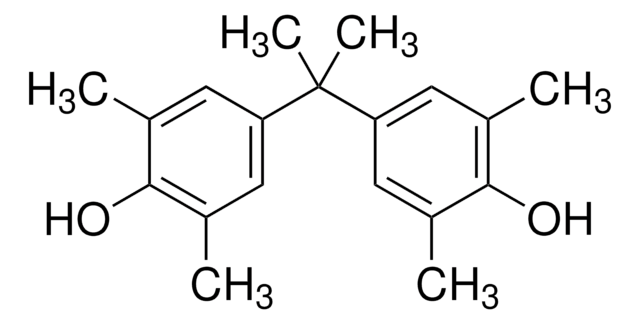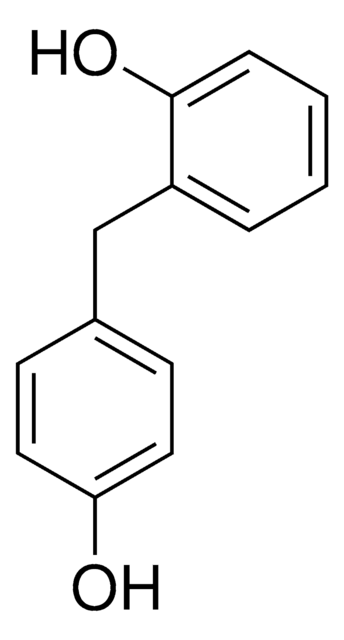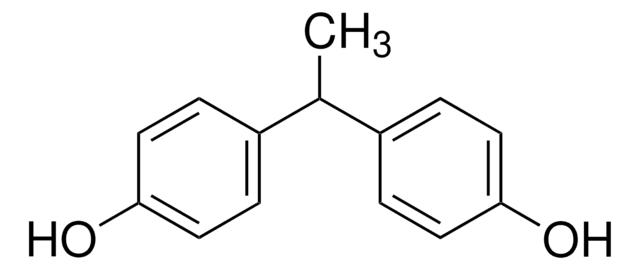B46808
Bis(2-hydroxyphenyl)methane
98%
Synonym(s):
2,2′-Methylenediphenol
Sign Into View Organizational & Contract Pricing
All Photos(1)
About This Item
Linear Formula:
CH2(C6H4OH)2
CAS Number:
Molecular Weight:
200.23
EC Number:
MDL number:
UNSPSC Code:
12352100
PubChem Substance ID:
NACRES:
NA.22
Recommended Products
Quality Level
Assay
98%
form
powder
mp
113-118 °C (lit.)
SMILES string
Oc1ccccc1Cc2ccccc2O
InChI
1S/C13H12O2/c14-12-7-3-1-5-10(12)9-11-6-2-4-8-13(11)15/h1-8,14-15H,9H2
InChI key
MQCPOLNSJCWPGT-UHFFFAOYSA-N
Looking for similar products? Visit Product Comparison Guide
Related Categories
Signal Word
Warning
Hazard Statements
Precautionary Statements
Hazard Classifications
Eye Irrit. 2 - Skin Irrit. 2 - STOT SE 3
Target Organs
Respiratory system
Storage Class Code
11 - Combustible Solids
WGK
WGK 3
Flash Point(F)
Not applicable
Flash Point(C)
Not applicable
Personal Protective Equipment
dust mask type N95 (US), Eyeshields, Gloves
Choose from one of the most recent versions:
Already Own This Product?
Find documentation for the products that you have recently purchased in the Document Library.
Nathan R Pillsbury et al.
The journal of physical chemistry. A, 113(17), 5013-5021 (2009-04-08)
Stimulated emission pumping-population transfer spectroscopy (SEP-PTS) has been used to directly measure the energy threshold to isomerization between the two conformational isomers of bis(2-hydroxyphenyl)methane. These conformers have been shown in the preceding paper (DOI 10.1021/jp8098686) to be an OH...O H-bonded
M Bruze
Contact dermatitis, 14(4), 228-232 (1986-04-01)
The sensitizing capacity of 2,2(1)-dihydroxydiphenyl methane (2,2(1)-HPM), 4,4(1)-dihydroxydiphenyl methane (4,4(1)-HPM) and 2,4(1)-dihydroxydiphenyl methane (2,4(1)-HPM) was investigated with the guinea pig maximization test. These compounds are known contact sensitizers in phenol-formaldehyde resins. The study was performed to assess and compare their
Occupational allergic contact dermatitis from epoxy resins based on bisphenol F.
A Pontén et al.
Contact dermatitis, 41(4), 235-235 (1999-10-09)
Nathan R Pillsbury et al.
The journal of physical chemistry. A, 113(17), 5000-5012 (2009-04-08)
Laser-induced fluorescence, single-vibronic level fluorescence (SVLF), UV hole burning, and fluorescence dip infrared (FDIR) spectroscopy have been carried out on bis-(2-hydroxyphenyl)methane in order to characterize the ground-state and first excited-state vibronic spectroscopy of this model flexible bichromophore. These studies identified
M Bruze et al.
Dermatosen in Beruf und Umwelt. Occupation and environment, 33(6), 216-220 (1985-01-01)
16 patients with contact allergy to phenol-formaldehyde resins (P-F-R) were patch tested with 3 dihydroxydiphenyl methanes (bisphenol F). The chemical investigation by high pressure liquid chromatography indicated that the dihydroxydiphenyl methanes (HPM) were pure and separable. 9 patients reacted to
Our team of scientists has experience in all areas of research including Life Science, Material Science, Chemical Synthesis, Chromatography, Analytical and many others.
Contact Technical Service







